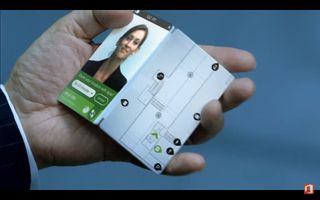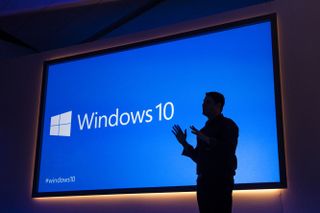Yes, the Surface phone should be a full PC — and this is how it should be marketed
Rumors of a Surface phone from Microsoft have swirled for years. But there's far more to it.

I don't believe Microsoft will ever release a Surface Phone. I do believe Microsoft will launch a category-defining ultimate mobile device that will play to the company's strengths rather than its proven weakness. Smartphones are Microsoft's Achilles Heel. Thus, Microsoft's ultimate mobile device will not be a phone.
Many critics claim that due to Microsoft's poor mobile ecosystem a Surface-branded ultimate mobile device, even with all the bells and whistles, is doomed to failure. I made a similar argument not long ago.
I appealed to Microsoft to exhibit a show of force in various ecosystem-building areas at BUILD 2017. Microsoft needs to make great, even unorthodox, efforts to woo developers to its ecosystem and ensure the platform's relevance in the future of increasingly mobile personal computing. There are specific areas — UWP, apps, mindshare, partnerships and more — which Microsoft must address if the "Surface phone" is to succeed.
Though Microsoft must develop its ecosystem to ensure long-term success, I believe the company has a measured way back into the mobile space, without going head-to-head with Apple and Google. It's all in how Microsoft markets the ultramobile Surface PC: it's not a phone.
Recognizing strengths and weaknesses
Microsoft's way back into mobile won't be with a dramatic splash. It will have to be a slow, subtle and methodic progression — first dipping the toe, then slowly wading into ever-deeper water.

Microsoft will have to focus on its strengths, forsaking the traditional approach to mobile. That old model failed Microsoft, leading to retrenchment, refocusing on enterprise, and a less-than-one-percent market share with only a handful of OEM partners. Smartphones are not Microsoft's forte.
Its strength is in PCs, as its decades-long dominance proves. The success of the Surface brand is proof of Microsoft's talent for innovation.
Get the Windows Central Newsletter
All the latest news, reviews, and guides for Windows and Xbox diehards.
Though Microsoft's CEO Satya Nadella conceded the smartphone war, he didn't concede the mobile space.
Nadella asserted Microsoft would launch an ultimate mobile device "beyond the curve in mobile." He's aware of Microsoft's weaknesses and strengths — category-defining PCs from the Surface Pro to Surface Studio to HoloLens are the future.
Smartphones are dead: Enter the ultramobile PC
I believe a Windows 10 ultramobile Surface PC with telephony is on the horizon, and that Microsoft can market it to the enterprise and consumers.
Mobile matters
Admittedly, there's been no official validation of an ultramobile Surface PC. I wouldn't expect such — Microsoft didn't pre-announce the Surface or HoloLens, either.
Despite its silence concerning mobile (and past failures) Redmond must bring something that plays toward its strengths to the mobile space.
The smartphone is currently the key to a company's broader ecosystem. Thus, a personal mobile device, not necessarily a smartphone, is a necessary component of Microsoft's UWP and Windows 10 Device family. Microsoft's pocketable mobile option will be a PC, not a phone.
There's demand for Windows laptops and 2-in-1 PCs
Microsoft's strength in PCs isn't founded only on its decades-long legacy as the provider of the dominant PC platform. Recent data that takes into account the company's category-defining strategy with the Surface progresses that legacy into the current era of personal computing and mobility.
Research firm IDC reported on the success of Windows laptops and 2-in-1s, finding that such devices are desired by consumers, and even predicting growth in the market over traditional tablets. Furthermore, JD Powers 2017 US Tablet Satisfaction Study found that customers are more satisfied with the productivity-focused Microsoft Surface than the consumption-focused iPad and Android tablets.
Riding the momentum

Microsoft's ultramobile Surface should, therefore, be marketed as a PC. Consumers want PCs, after all.
How might Microsoft market to the masses? Like the Surface Pro, it will likely have a heavy enterprise focus but with consumer appeal. It'll also be positioned to inspire manufacturing partners to mimic the concept and design.
The only visuals we have of what this potential device might look like are from patents and Microsoft Future Vision videos.













Did Microsoft give us a glimpse of its Surface phone vision?
This doesn't guarantee anything, but history has set a precedence. Skype Real-time Translation (and other technologies) were foreshadowed in Microsoft's future vision videos. Surface Studio patents were also reflective of what came to market, so too may these folding device patents eventually make it to reality (though, admittedly, they're probably a long way off).
Evolving a concept
Microsoft can advance the HP Lap Dock concept to be a more integrated experience to market the ultramobile Surface.
Redmond can promote what will initially appear to be a powerful, smaller and more portable Surface Book. In reality this "laptop" would be a peripheral which houses a fold-able Window 10 ultramobile cellular PC in the base which powers the peripheral (and wirelessly projects to the detached "digital clipboard") via Continuum.
As a Windows 10 PC users can use Win32 (and Store) apps which are practical in a "laptop" environment. Users could also experience all other Windows 10 features from inking, Windows Mixed-Reality and game streaming.
When the ultramobile PC is ejected from the peripherals base users can unfold it into a larger touch-friendly mini-tablet, run Store apps, connect to other PCs and screens via Continuum and purchase cellular data from the Store.
Finally, via eSIM the ultramobile Surface will be a "phone."
Microsoft's Trojan phone
The rumors of a Surface phone began about five years ago. But before the UWP and Continuum for phone, visualizing what value such a device would have brought to market is difficult. The consistent nature of Windows 10 across devices, CSHELL and the UWP has opened the door to a single device functioning as multiple devices by allowing hardware, OS, and apps to conform seamlessly to a user's context.
There's merit to Microsoft positioning an ultramobile Surface from a purely PC perspective. Consumers want Windows laptops and 2-in-1s after all, not phones. The proliferation of a new PC category into the market that is subtly also a phone allows Microsoft to wade slowly into the mobile space without a "rival-confronting" splash into the smartphone space.

While this strategy is being executed, Microsoft should aggressively and diligently build its ecosystem. Since the primary focus of this device is not on the needed Store apps of which there is a shortage, this strategy allows for category-defining phone hardware to get into the hands of consumers and businesses without the full impact of the detrimental app-gap effects associated with a purely phone-focused device.
A first step
As with any new device category, this will be a first-generation product that will use available tech. Just as we saw happen with smartphones, as the ultramobile PC category becomes established and expands, the devices will be become more powerful and may for many be able to be that one device that is every device for them — from phone to laptop to desktop to tablet.
Interestingly, Windows Insider Lead, Dona Sarkar, recently referenced how her Surface Book functions as a phone.
Im never without it! That Surfacebook of mine does make excellent phone calls!Im never without it! That Surfacebook of mine does make excellent phone calls!— Dona Sarkar (@donasarkar) April 8, 2017April 8, 2017
If nothing else Microsoft's mobile offensive is about changing the game.
I also wrote:
With 'Surface phone,' will Microsoft learn from its past marketing mistakes?
If Microsoft doesn't kill at BUILD 2017 the Surface phone is dead on arrival
This is what has to happen first in order for a Surface phone to succeed
Jason L Ward is a columnist at Windows Central. He provides unique big picture analysis of the complex world of Microsoft. Jason takes the small clues and gives you an insightful big picture perspective through storytelling that you won't find *anywhere* else. Seriously, this dude thinks outside the box. Follow him on Twitter at @JLTechWord. He's doing the "write" thing!
